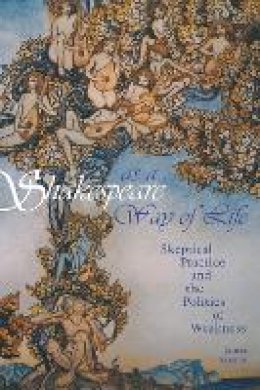
Stock image for illustration purposes only - book cover, edition or condition may vary.
Shakespeare as a Way of Life: Skeptical Practice and the Politics of Weakness
James Kuzner
€ 94.93
FREE Delivery in Ireland
Description for Shakespeare as a Way of Life: Skeptical Practice and the Politics of Weakness
Hardback. Shakespeare is worth reading because his works help us to make epistemological weakness into a way of life. Kuzner shows how Shakespeare's works offer a means for coming to terms with basic uncertainties about freedom, the world's abundance, and the demands of love and social life. Num Pages: 232 pages. BIC Classification: 2AB; DSGS; HPK; JPA. Category: (G) General (US: Trade). Dimension: 3887 x 5817 x 20. Weight in Grams: 408.
Shakespeare as a Way of Life shows how reading Shakespeare helps us to live with epistemological weakness and even to practice this weakness, to make it a way of life. In a series of close readings, Kuzner shows how Hamlet, Lucrece, Othello, The Winter’s Tale, The Tempest, and Timon of Athens, impel us to grapple with basic uncertainties: how we can be free, whether the world is abundant, whether we have met the demands of love and social life.
To Kuzner, Shakespeare’s skepticism doesn’t have the enabling potential of Keats’s heroic “negativity capability,” but neither is that skepticism the corrosive disease that necessarily issues in tragedy. ... Read more
Product Details
Format
Hardback
Publication date
2016
Publisher
Fordham University Press United States
Number of pages
232
Condition
New
Number of Pages
232
Place of Publication
New York, United States
ISBN
9780823269938
SKU
V9780823269938
Shipping Time
Usually ships in 15 to 20 working days
Ref
99-15
About James Kuzner
James Kuzner is Associate Professor of English at Brown University. He is the author of Shakespeare as a Way of Life and Open Subjects.
Reviews for Shakespeare as a Way of Life: Skeptical Practice and the Politics of Weakness
"This is broad and provocative thinking of the first order that promises to show how Shakespeare engages what remain some of the deepest questions concerning the human condition. Throughout the book, Kuzner reads Renaissance humanism, ethics, epistemology and theology in relation to their modern responses and redirections, reinvigorating historical study and theoretical discourse alike through the kinds of astute and ... Read more
